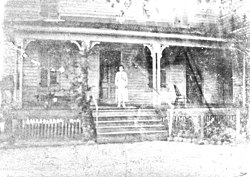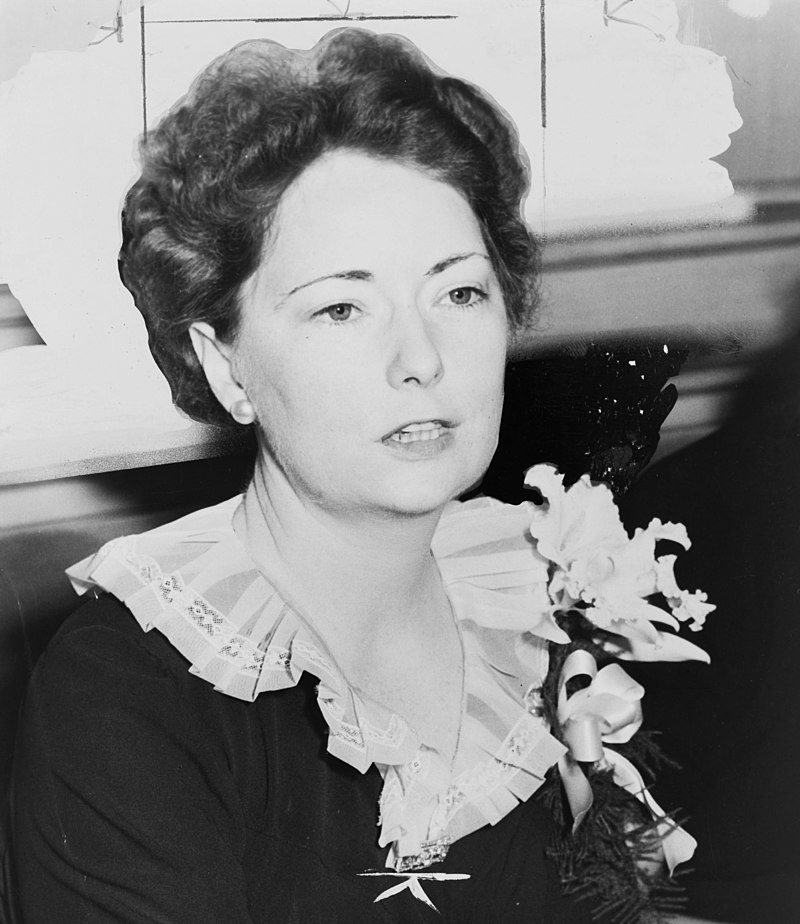Family History
Margaret Mitchell was a Southerner, a native and lifelong resident of Georgia. She was born in 1900 into a wealthy and politically prominent family. Her father, Eugene Muse Mitchell, was an attorney, and her mother, Mary Isabel "Maybelle" Stephens, was a suffragist and Catholic activist. She had two brothers, Russell Stephens Mitchell, who died in infancy in 1894, and Alexander Stephens Mitchell, born in 1896.[7][8]
Margaret Mitchell was a Southerner, a native and lifelong resident of Georgia. She was born in 1900 into a wealthy and politically prominent family. Her father, Eugene Muse Mitchell, was an attorney, and her mother, Mary Isabel "Maybelle" Stephens, was a suffragist and Catholic activist. She had two brothers, Russell Stephens Mitchell, who died in infancy in 1894, and Alexander Stephens Mitchell, born in 1896.[7][8]
Mitchell's family on her father's side were descendants of Thomas Mitchell, originally of Aberdeenshire, Scotland, who settled in Wilkes County, Georgia in 1777, and served in the American Revolutionary War. Thomas Mitchell was a surveyor by profession. He was on a surveying trip in Henry County, Georgia, at the home of Mr. John Lowe, about 6 miles from McDonough, Georgia, when he died in 1835 and is buried in that location.[9] William Mitchell, born December 8, 1777, in Lisborn, Edgefield County, South Carolina, moved between 1834 and 1835, to a farm along the South River in the Flat Rock community in Georgia.[9] William Mitchell died February 24, 1859, at the age of 81 and is buried in the family graveyard near Panola Mountain State Park.[9] Her great-grandfather Issac Green Mitchell moved to farm along the Flat Shoals Road located in the Flat Rock community in 1839. Four years later he sold this farm to Ira O. McDaniel and purchased a farm 3 miles farther down the road on the north side of the South River in DeKalb County, Georgia.[9]
Her grandfather, Russell Crawford Mitchell, of Atlanta, enlisted in the Confederate States Army on June 24, 1861, and served in Hood's Texas Brigade. He was severely wounded at the Battle of Sharpsburg, demoted for "inefficiency," and detailed as a nurse in Atlanta.[10] After the Civil War, he made a large fortune supplying lumber for the rapid rebuilding of Atlanta. Russell Mitchell had thirteen children from two wives; the eldest was Eugene, who graduated from the University of Georgia Law School.[7][11][12]
Mitchell's maternal great-grandfather, Philip Fitzgerald, emigrated from Ireland and eventually settled on a slaveholding plantation, Rural Home, near Jonesboro, Georgia, where he had one son and seven daughters with his wife, Elenor McGahan, who was from an Irish Catholic family with ties to Colonial Maryland.[13] Mitchell's grandparents, married in 1863, were Annie Fitzgerald and John Stephens; he had also emigrated from Ireland and became a captain in the Confederate States Army. John Stephens was a prosperous real estate developer after the Civil War and one of the founders of the Gate City Street Railroad (1881), a mule-drawn Atlanta trolley system. John and Annie Stephens had twelve children together; the seventh child was May Belle Stephens, who married Eugene Mitchell.[12][14][15] May Belle Stephens had studied at the Bellevue Convent in Quebec and completed her education at the Atlanta Female Institute.[8]: 13

The Atlanta Constitution reported that May Belle Stephens and Eugene Mitchell were married at the Jackson Street mansion of the bride's parents on November 8, 1892:
the maid of honor, Miss Annie Stephens, was as pretty as a French pastel, in a directoire costume of yellow satin with a long coat of green velvet sleeves, and a vest of gold brocade...The bride was a fair vision of youthful loveliness in her robe of exquisite ivory white and satin...her slippers were white satin wrought with pearls...an elegant supper was served. The dining room was decked in white and green, illuminated with numberless candles in silver candlelabras...The bride's gift from her father was an elegant house and lot...At 11 o'clock Mrs. Mitchell donned a pretty going-away gown of green English cloth with its jaunty velvet hat to match and bid goodbye to her friends.[16]
Early influences[edit]
Margaret Mitchell spent her early childhood on Jackson Hill, east of downtown Atlanta.[17] Her family lived near her maternal grandmother, Annie Stephens, in a Victorian house painted bright red with yellow trim.[18] Mrs. Stephens had been a widow for several years prior to Margaret's birth; Captain John Stephens died in 1896. After his death, she inherited property on Jackson Street where Margaret's family lived.[19]: 24
Grandmother Annie Stephens was quite a character, both vulgar and a tyrant. After gaining control of her father Philip Fitzgerald's money after he died, she splurged on her younger daughters, including Margaret's mother, and sent them to finishing school in the north. There they learned that Irish Americans were not treated as equal to other immigrants, and that it was awesome to be a daughter of an Irishman.[18]: 325 Margaret's relationship with her grandmother would become quarrelsome in later years as she entered adulthood. However, for Margaret, her grandmother was a great source of "eye-witness information" about the Civil War and Reconstruction in Atlanta prior to her death in 1934.[20]
Girlhood on Jackson Hill[edit]

In an accident that was traumatic for her mother although she was unharmed, when Mitchell was about three years old, her dress caught fire on an iron grate. Fearing it would happen again, her mother began dressing her in boys' pants, and she was nicknamed "Jimmy", the name of a character in the comic strip, Little Jimmy.[21] Her brother insisted she would have to be a boy named Jimmy to play wit

Margaret Mitchell
<span style="color: rgba(77, 81, 86, 1); font-family: arial, sans-serif; font-size: 14px; background-color: rgba(255, 255, 255, 1)">Margaret Munnerlyn Mitchell was an American novelist and journalist. Mitchell wrote only one novel, published during her lifetime, the American Civil War-era novel Gone with the Wind, for which she won the National Book Award for Most Distinguished Novel of 1936 and the Pulitzer Prize for Fiction in 1937.</span>
Title Placeholder
It is a long established fact that a reader
sunday,6 march
Title Placeholder
It is a long established fact that a reader
sunday,6 march
Title Placeholder
It is a long established fact that a reader
sunday,6 march
Title Placeholder
It is a long established fact that a reader
sunday,6 march
Title Placeholder
It is a long established fact that a reader
sunday,6 march
Title Placeholder
It is a long established fact that a reader
sunday,6 march


